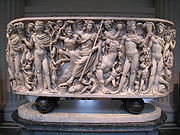It feels like ever since the Dionysians danced around the giant penis in the first days of Greek theatre, the debate has been raging. I can see it now: half of the revelers, drunk and having a debauched good time, insist that thier theatre ritual is for fun, entertainment. The other half are arguing that, in order for it to be useful, catharsis, an emotional reaction in the audience must have taken place. 
It’s thousands of years later, and the debate rages on.
What is theatre’s job? To provoke, or to entertain?
Here in Vancouver, it feels like we are in two very divided camps. There are the bigger theatres, who, for reasons of having to pay rent and actors and amazing set and costume designers, have big budgets, and are very reliant on box office revenue for thier business model to work. Then, there are other, smaller, independent theatre companies that have lower overhead and a passion for the latest controversial script.
The big theatre companies have to produce stuff that they know is going to sell tickets. Hence the reason Les Miserables goes into previews this week here in Vancouver. The smaller companies refer to the work they do as more of a capital “A” Art: holding up a mirror to society. Check out this recent post by Travis Bedard on that subject and its consequences.
I don’t really have the answer. As a marketer, I believe there is space in this world for both. The audience that may go to Les Miserables might not be interested in seeing Dying City. They are different markets. Or maybe they will. What I do know is this: every time someone goes to the theatre, we have a chance to convert them. If they go, and they like it, because it is either entertaining or provocative, there is a good chance they’ll come back. And if they come back, maybe they’ll be more daring, and try something that is out of their comfort zone.
So let’s just produce good theatre. Good theatre that makes people want to come back for more entertainment or to make them think. Because at least they are going to the theatre.
I welcome your thoughts on this debate in the comments below.
What happens when you watch a play? Two things at once. Actors perform on a stage in present time, and characters engage in conflict somewhere else, out of time. And you believe them both, trapped between two worlds, susceptible to thought and feeling. . This is the mystic essence of theater as religion. Like the body and blood of Christ. You recognize the real-world truth of the charade, but if you don’t believe the art as well—if it doesn’t carry you beyond mundane reality—you have no business being there: Either the play is very bad (or badly played) or you’re incapable of appreciating it. (Some people can’t be mesmerized; some don’t believe in God.)
That essence, by the way, is what distinguishes theater from film and television. Actors on film aren’t present in the space. An audience might be utterly absorbed by the action, but if the counterpoint reality is missing, there’s no mystery.
Actors, then, like priests, are trained to recite the words, perform the sacraments, to lead the audience, the congregation, to believe…
Theater always deals in the dual realities of the human paradox. It shapes meaning from chaos and void, makes sense of the absurd, links the one and all in every consciousness through metaphor and illusion. The logic of the argument is magnified by the emotion of its context. The suspension of disbelief enables belief in any and all things.
Brecht put ‘fun’ (“spass”) before provocation/teaching … theatre job is to do entertain and to provoke. Either way it confirms our humanity.
I love Martin Esslin’s take on it … theatre is ‘thinking out loud in front of ourselves.’
To entertain.
If you put “to provoke” or “to enact social change” or “to fix the world,” people rarely show up. And theatre doesn’t exist without an audience.
That being said, entertainment can (and in many cases, should) be provocative. They are two sides of the same coin.
If you want to change the world, start a charity. If you want to run a theatre, start a tribe. (Yes, I’m paraphrasing from The Mission Paradox Blog.)